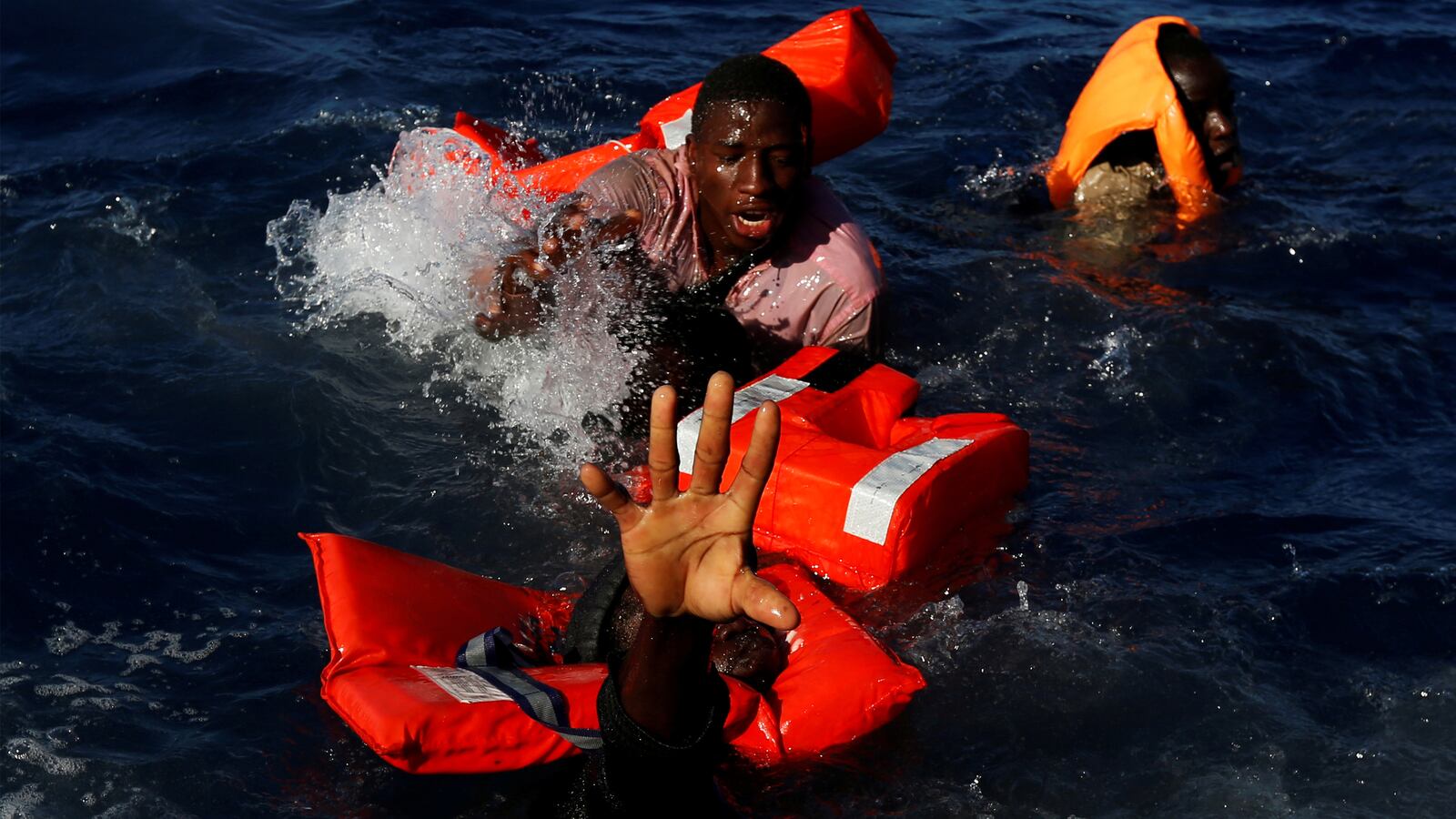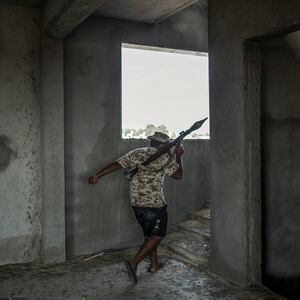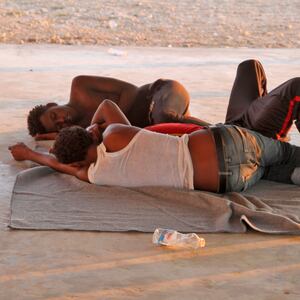For more than a month, Sened contemplated whether it was better to risk getting murdered or risk starving to death.
Sened is the nickname of a 36-year-old Eritrean man trapped in Libya’s civil war—one of 43,000 refugees in a country that sometimes serves as an escape valve from Africa to Europe. But it’s also a trap.
The United Nations facility where Sened was staying originally was opened as a site to house refugees until they could be moved to another country, often taking perilous voyages out into the waters of the Mediterranean. Because of the ongoing violence in Libya, refugees rushed to the site, but the European Union’s policy of funding the Libyan Coast Guard to stop boats from leaving Africa has left thousands of people with no place to go.
In lawless Libya, migrants are prey to militias. Kidnapping is widespread, evidence of slavery is rife, and torture is common. So when Sened took refuge inside the site the U.N. opened just a year ago, he assumed safety. Then, on Dec. 25, the U.N. refugee agency, or UNHCR, gave him a letter saying he and 700 others like him wouldn’t be fed in the new year. Instead, the letter offered around $100 to move to Tripoli, where he felt unsafe.
“UNHCR is pressuring us to leave the center. They tell many times to go on to the street,” Sened told The Daily Beast over WhatsApp in early January. Sened described a typical meal of bread and dirty water. Tuberculosis spread inside the site’s walls. Still, it was better than the alternative. “Facing us [outside] is human trafficking, torturing, taking to slavery, no regular medication for sick people,” Sened texted.
Sened and other refugees interviewed by The Daily Beast in January believed the U.N. was pushing them into a very dangerous situation by withholding food. But Sened was starting to crack without it. “We can not [be] able to survive with no foods and water,” he told The Daily Beast in mid-January. When two refugees left the center about that time they were killed within days by suspected human traffickers. Finally, defeated, afraid, and hungry, Sened and around a hundred others left the facility and ventured into Tripoli’s streets on Jan. 30.
That same day, the U.N. said it would suspend all operations at the facility because of safety concerns.
“Training exercises, involving police and military personnel, are taking place just a few meters away from units housing asylum seekers and refugees,” Jean-Paul Cavalieri, UNHCR’s chief of mission in Libya, said in a statement.
But some aid workers in Libya saw the U.N. pullout as a more cynical ploy to push refugees out of the center. The logic of shutting down the facility for safety reasons is “questionable” because other facilities the U.N. works in have similar conditions, one aid worker told The Daily Beast in a text message. “The suspension of activities is surprising and does not answer the question as to the future of those who remain inside.”
Clearly the overcrowded site was “no longer functioning as a transit center,” as Cavalieri’s statement put it. But neither is it a refuge.
When asked what would happen to the migrants who did not want to leave the center and did not have food, Charlie Yaxley, a spokesperson for the U.N. refugee agency, said “that is their decision in the end. We are offering safer alternatives, that are still far from ideal, but Libya is a war zone and there are no easy solutions.”
Sened is still in Tripoli, floating among a constellation of militias armed to the teeth. “We are in the urban [area] but it is not safe,” he texted.
It’s fair to criticize the U.N. for “what is clearly a very fraught facility,” but most of the blame should go to “European countries that have decided to outsource their immigration enforcement to unaccountable militias in an active war zone,” said Jeremy Konyndyk, the former chief of U.S. Disaster Assistance during the Obama administration. “We should be asking why it is that the U.N. needs to be helping these migrants in the first place.”
While the U.N.’s calculus in Libya appears cold, it is part of a broader dilemma for an organization that apparently feels compelled to play hunger games as a controversial solution to catastrophic situations. Documents, aid workers and former U.N. officials interviewed by The Daily Beast show the on several occasions the organization has blocked food access to the displaced of South Sudan in East Africa, a nation that has been devastated by more than five years of civil war.
To the United Nations, the policy is the outcome of an unanswerable moral dilemma—whether, with the goal of helping the needy, it is better to work with militias who perpetuate misery, and whether helping the vulnerable can actually make things worse.
Undoubtedly, the U.N. does good in both countries. U.N. peacekeepers in South Sudan have likely saved tens of thousands of lives. The U.N. refugee agency in Libya expects to help some 100,000 people in 2020. "Blaming the United Nations when things go wrong is like blaming Madison Square Garden when the Knicks play badly,” is a famous saying of the late Richard Holbrooke, the former American diplomat. Even those critical of the policies in both countries nevertheless strain to convey the nuances of removing or blocking food aid.
But other evidence suggests an uncompromising plan driven by pressure from bureaucrats thousands of miles away. A former senior U.N. official in South Sudan with firsthand knowledge of withheld food aid described the policy as “morally abhorrent” in an email to The Daily Beast. An aid official in Libya told The Guardian the U.N. was starving refugees out of the displacement site. (A spokesperson for the U.N. mission in South Sudan, Francesca Mold, did not return repeated requests for comment. )
The U.N.’s concerns about protecting and feeding individuals stems from the organization’s failure to save lives during the genocides in the 1990s in Bosnia and Rwanda. “The devastating unintended consequences of the UN’s failure to protect designated ‘safe havens’ in Srebrenica in 1995 have led to general reluctance within UN peacekeeping to create such areas without the adequate capabilities to defend them,” read an internal 2013 U.N. report from South Sudan obtained by The Daily Beast.
The U.N. “should not provide food as this would make it very hard to encourage the civilians to leave the base,” the report said. But a few months after the report was written, a civil war broke out that cut largely along ethnic lines. Minority populations rushed to U.N. sites for safety in the midst of mass killing. The U.N. likely saved thousands of lives by protecting people with blue helmeted peacekeepers in South Sudan. (They have not been authorized by the Security Council to operate in Libya.)
After the December 2013 civil war began in South Sudan, the U.N. changed its policy to allow a majority of people to receive food aid. But the U.N. believed that some people rush to the U.N.’s sprawling, Mad-Max-like protection centers “to receive better shelter and humanitarian assistance, including food aid,” according to a confidential 2016 U.N. report, which had an introduction by then Secretary General Ban Ki Moon. According to a copy of the report obtained by The Daily Beast, the U.N. mission feared attracting more people than it had to with food aid, which it commonly referred to as a “pull factor.”
But others insisted South Sudanese went to the U.N. sites for safety, not for free food. “Not one individual, not one South Sudanese that we spoke to, wants to live in [the protection] sites,” said the then ambassador to the U.N., Samantha Power, when she visited one site in September 2016. “When we asked each and every one in very different circumstances, each from different parts of the country, why aren’t you going home? Why are you here? The answer was not, ‘I want the food’ or ‘I want the water.’ It was ‘I’m terrified.’”
Although the World Food Program is officially in charge of providing food aid inside the sites protected by blue helmets in South Sudan, documents, aid workers and former U.N. officials say the peacekeeping mission would block people from being registered to receive that assistance. One of the most dramatic shutdowns occurred at the U.N.’s displacement site in the town of Bentiu that houses some 120,000 people.
Konyndyk, the former U.S. head of disaster assistance said that when refugees or the displaced are being repatriated it’s not unusual for aid to be decreased that bolsters their return. He cited examples in Sierra Leone and Liberia in the early 2000s in addition to the policy in Libya, and while not aware of the situation in South Sudan said that often times international organizations were left with impossible choices. Konyndyk said it is frustrating “when we blame the cleanup crew—however imperfect they may be—rather than the folks who made the mess.”








